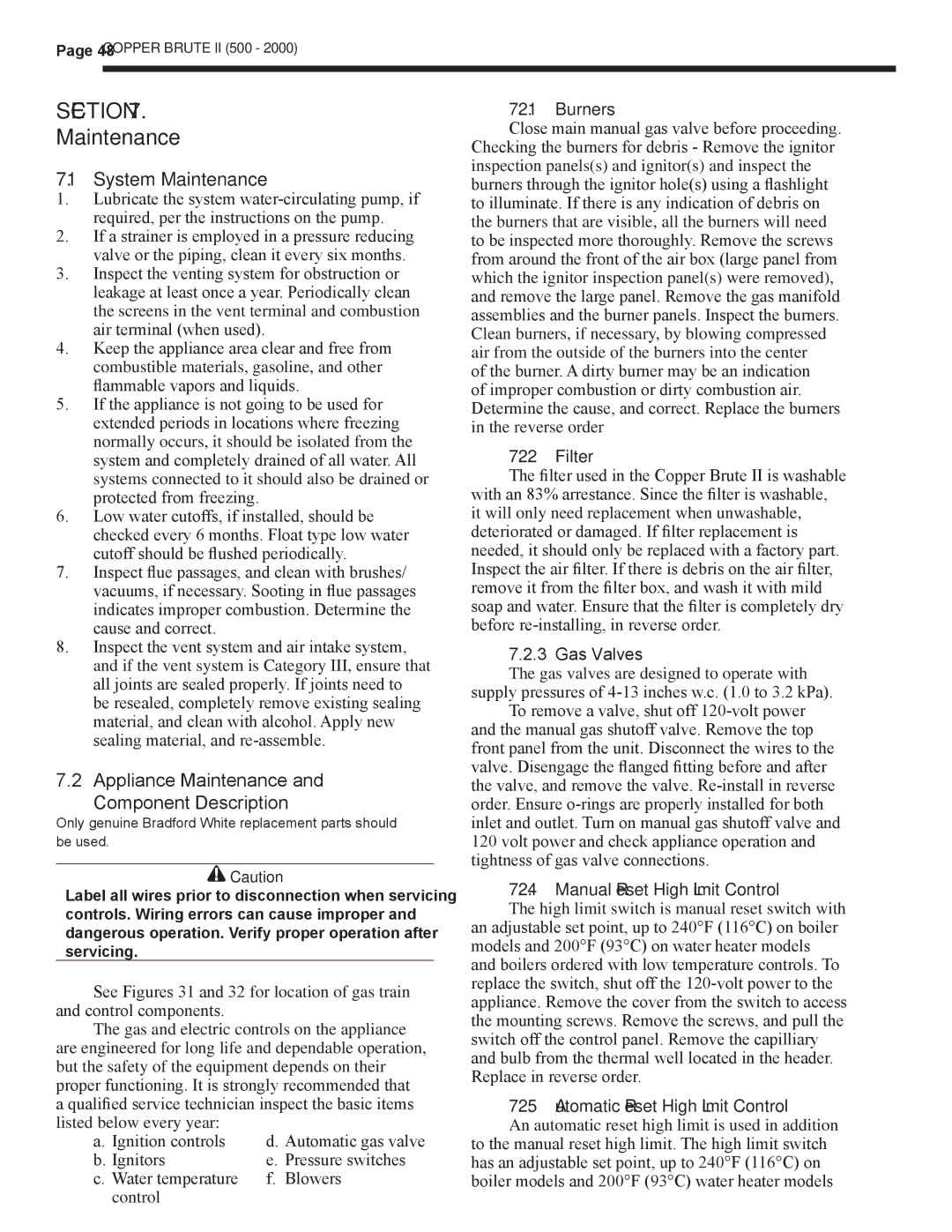
Page 48 | BRADFORD WHITE CORP. |
|
|
|
|
SECTION 7.
Maintenance
7.1 System Maintenance
1.Lubricate the system
2.If a strainer is employed in a pressure reducing valve or the piping, clean it every six months.
3.Inspect the venting system for obstruction or leakage at least once a year. Periodically clean the screens in the vent terminal and combustion air terminal (when used).
4.Keep the appliance area clear and free from combustible materials, gasoline, and other flammable vapors and liquids.
5.If the appliance is not going to be used for extended periods in locations where freezing normally occurs, it should be isolated from the system and completely drained of all water. All systems connected to it should also be drained or protected from freezing.
6.Low water cutoffs, if installed, should be checked every 6 months. Float type low water cutoff should be flushed periodically.
7.Inspect flue passages, and clean with brushes/ vacuums, if necessary. Sooting in flue passages indicates improper combustion. Determine the cause and correct.
8.Inspect the vent system and air intake system, and if the vent system is Category III, ensure that all joints are sealed properly. If joints need to be resealed, completely remove existing sealing material, and clean with alcohol. Apply new sealing material, and
7.2 Appliance Maintenance and
Component Description
Only genuine Bradford White replacement parts should be used.
![]() Caution
Caution
Label all wires prior to disconnection when servicing controls. Wiring errors can cause improper and dangerous operation. Verify proper operation after servicing.
See Figures 31 and 32 for location of gas train
and control components.
The gas and electric controls on the appliance
are engineered for long life and dependable operation, but the safety of the equipment depends on their proper functioning. It is strongly recommended that a qualified service technician inspect the basic items
listed below every year: |
|
a. Ignition controls | d. Automatic gas valve |
b. Ignitors | e. Pressure switches |
c. Water temperature | f. Blowers |
control |
|
7.2.1 Burners
Close main manual gas valve before proceeding. Checking the burners for debris - Remove the ignitor inspection panels(s) and ignitor(s) and inspect the burners through the ignitor hole(s) using a flashlight to illuminate. If there is any indication of debris on the burners that are visible, all the burners will need to be inspected more thoroughly. Remove the screws from around the front of the air box (large panel from which the ignitor inspection panel(s) were removed), and remove the large panel. Remove the gas manifold assemblies and the burner panels. Inspect the burners. Clean burners, if necessary, by blowing compressed air from the outside of the burners into the center
of the burner. A dirty burner may be an indication of improper combustion or dirty combustion air. Determine the cause, and correct. Replace the burners in the reverse order
7.2.2 Filter
The filter used in the Copper Brute II is washable with an 83% arrestance. Since the filter is washable, it will only need replacement when unwashable, deteriorated or damaged. If filter replacement is needed, it should only be replaced with a factory part. Inspect the air filter. If there is debris on the air filter, remove it from the filter box, and wash it with mild soap and water. Ensure that the filter is completely dry before
7.2.3 Gas Valves
The gas valves are designed to operate with supply pressures of
and the manual gas shutoff valve. Remove the top front panel from the unit. Disconnect the wires to the valve. Disengage the flanged fitting before and after the valve, and remove the valve.
7.2.4Manual Reset High Limit Control
The high limit switch is manual reset switch with
an adjustable set point, up to 240°F (116°C) on boiler models and 200°F (93°C) on water heater models and boilers ordered with low temperature controls. To replace the switch, shut off the
7.2.5Automatic Reset High Limit Control
An automatic reset high limit is used in addition
to the manual reset high limit. The high limit switch has an adjustable set point, up to 240°F (116°C) on boiler models and 200°F (93°C) water heater models
